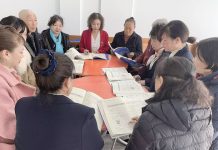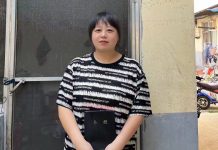 JIANGSU, China – To many Christian leaders in China, Reverend Bao Jiayuan is a household name. For nearly 30 years, he has laboured tirelessly in the China Christian Council/TSPM (CCC/ TSPM), advancing the work of Bible printing and distribution in China as well as enhancing the Chinese Church’s overseas relations. To United Bible Societies China Partnership (UBS CP), he has been a great friend and partner. Today, at 72 and fresh in retirement, he is no less fervent in his passion for God’s work.
JIANGSU, China – To many Christian leaders in China, Reverend Bao Jiayuan is a household name. For nearly 30 years, he has laboured tirelessly in the China Christian Council/TSPM (CCC/ TSPM), advancing the work of Bible printing and distribution in China as well as enhancing the Chinese Church’s overseas relations. To United Bible Societies China Partnership (UBS CP), he has been a great friend and partner. Today, at 72 and fresh in retirement, he is no less fervent in his passion for God’s work.
(Photo: Rev Bao delivering a message at the Thanksgiving Service of the Launch of Annotated West Lisu Bible in Yunnan Province in Jan 2015)
What keeps a man going and growing spiritually from strength to strength despite changing circumstances and challenging times? For Rev. Bao, it is the invigorating power of God’s Word in his life. His inspiration comes from Apostle Paul’s convincing defense before King Agrippa recorded in Acts 26. At the end of Paul’s account of how Jesus Himself had appeared and commissioned him to open the eyes of Jews and Gentiles so that they may receive forgiveness and salvation, Paul made the following statement, “Therefore, O King Agrippa, I was not disobedient to the heavenly vision.” (Acts 26:19, ESV). This single verse would form the basis of Rev. Bao’s call into full-time Christian ministry when the opportunity for service arose in the 1980s.
Steeped in Scripture, Dedicated for Service
Rev. Bao comes from an illustrious line of pastors and preachers, beginning from his great-grandfather who had converted to Christianity during the Taiping Revolution in the mid 19th century. Although the revolution failed, his great-grandfather became a preacher. His grandfather was a church elder and his father, a pastor in a local evangelical church. As a young boy, Rev. Bao was dedicated for Christian service by his parents.
“When I was young, my mother would gather my four siblings and me for regular evening prayers and Scripture memory. We learnt God’s Word through singing verses set to catchy tunes,” Rev. Bao reminisced fondly. These verses, etched in his heart and mind through constant repetition and recall, were to shape his worldview and stand him in good stead when the family fell on hard times during the years of political upheaval in the 1960s.
Early Years of Spiritual Plenty for Braving Later Days in the Wilderness
As if to prepare the young Rev. Bao for rough, stormy days ahead, God put in him a great love for listening to sermons, attending revival meetings and reading Christian materials. During his teens, after-school hours were often spent either at revival meetings, hanging on every word those powerful preachers shared about God, or else voraciously reading the many beloved Christian books in his father’s personal library. At the same time, a godly Christian lady taught him music so that he was already an able pianist in his youth. Those good times gradually came to an end in the late 1950s with tightening restrictions on religious activities.
An unexpected door opened for Rev Bao for theological training in early 1960s. “Seminaries were closed after 1958, but the seminary in Nanjing was reopened in 1962, just as I was graduating from high school. To me, that was a sign that God wanted me to be trained theologically,” Rev. Bao shared. It turned out that after 1962, the seminary was not allowed to take in any more students and that was to be the case for nearly two decades thereafter. Even in politically uncertain times, Rev Bao managed to spend four years at Nanjing Union Theological Seminary, completing much of his training until the Cultural Revolution began in 1966. The seminary was made the headquarters of the Red Guards. Most of the books in the library were burnt. All students and staff were thrown out of campus.
Hard Times at Close Quarters
Rev. Bao shared candidly, “Because my father was a senior pastor, we became a target for ‘pidou’ (批斗),” which was the characteristic public criticism and denouncement of that era. “Those were very hard times. I was still young and so was not badly persecuted. But my grandfather and father, they suffered much.” Rev. Bao said matter-of-factly. His grandfather passed away during the Cultural Revolution in the ‘60s and relatives of his father’s generation, like his aunt, were not spared from the persecution.
The Red Guards came to the vicarage seven times, took the theological books in his father’s library that Rev. Bao had loved and eventually evicted them from their home, putting them up in two small rooms elsewhere. “But they didn’t take my English King James Bible. They didn’t know it was a Bible and thought it was a dictionary. Having that Bible gave me a sense of security, that God and His Word were with me,” Rev. Bao recounted.
“Our family was so poor in those days but God provided for us.” When asked if the elders in his family ever regretted their Christian service or recanted their faith, he said with conviction, “No, never. They knew their calling was to serve God and never regretted it.” The example of commitment modeled by his grandfather and father made a deep impression on the young Rev. Bao.
For the next 13 years, all churches in Mainland China were closed. Religious activity went underground and all public expressions of faith were strictly prohibited. “Many church workers were sent to different places, some to farms in rural regions, some to factories,” he explained. Along with other youths, Rev Bao was settled in the rural areas to live and work in the farms.
Story: Angela Teo
Edited: Cynthia Oh
Photo: Jared Wong /UBS CP
2016 © United Bible Societies China Partnership







